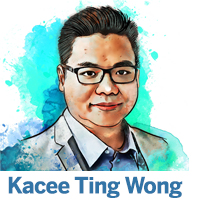Kacee Ting Wong and Tommy Suen say investors should be told the truth about Hong Kong, in particular about its favorable business environment
As Sir Ben Okri has correctly pointed out, the mystery of storytelling is the miracle of a single living seed which can populate whole acres of human minds. In order to weaponize storytelling for cognitive warfare, the US departments of State, Agriculture, Commerce, Homeland Security and Treasury recently issued a joint business advisory to discredit Hong Kong’s national security laws and its business environment. In an atmosphere of heightened geopolitical rivalry between China and the United States, the business advisory is an attempt by the US to shape the perceptions of corporate America in a direction that can strengthen the strategy of weakening China and destabilizing the Hong Kong Special Administrative Region.

 According to the advisory, the HKSAR government could attempt to use the national security laws’ “broadly defined offences” to prosecute those engaging in “routine business activities”, such as lobbying, market analysis and due diligence operations, as long as it determines that these activities threatened national security. The advisory also warns that the imposition of bounties by the Hong Kong Police Force on fugitives may negatively affect businesses’ staff, finances, legal compliance, regulations and operations.
According to the advisory, the HKSAR government could attempt to use the national security laws’ “broadly defined offences” to prosecute those engaging in “routine business activities”, such as lobbying, market analysis and due diligence operations, as long as it determines that these activities threatened national security. The advisory also warns that the imposition of bounties by the Hong Kong Police Force on fugitives may negatively affect businesses’ staff, finances, legal compliance, regulations and operations.
Addressing the nature of national security legislation, a spokesman of the HKSAR government clarified that such laws are inherent rights of sovereign states and align with international practices. The offences endangering national security are defined with precision and clarity in the National Security Law for Hong Kong (NSL) and the Safeguarding National Security Ordinance (SNSO). The spokesman also highlighted the constitutional protection of human rights in Hong Kong, aligning with international human rights standards. It is worth noting that offenses under the SNSO require a high prosecution threshold.
READ MORE: SAR govt opposes foreign interference in HK’s legal process
In defending the actions of law enforcement personnel, the spokesman said “law enforcement actions are based on evidence and are conducted strictly in accordance with the law, irrespective of the political stance, background, or occupation of the individual concerned”. After the passing of the SNSO in March, Beijing said the law would not target normal commercial transactions. The HKSAR government also reiterated that the law and work relevant to safeguarding national security in Hong Kong would not affect normal business operations.
Critics of the NSL and SNSO convey the worst possible impression by their unwillingness to criticize the broadly defined offences under the national security laws of their own governments. For example, the United Kingdom’s National Security Act 2023 has been criticized for its failure to define “safety or interests of the UK”. In response to the criticism, the British government stated that limiting this term by specifying certain conduct or including an explicit threshold would risk creating loopholes for hostile forces to exploit. The US should remember the flawed defense put forward by its British ally when Washington alleges that some of the key terms of Hong Kong’s national security laws are broadly defined.
Unlike the scary picture painted by the business advisory, the American business community in Hong Kong has given a truthful account of the business environment in the city. According to a business survey conducted by the American Chamber of Commerce in Hong Kong (AmCham) in late 2023, 81 percent of the respondents reported the same or an increase in revenue in 2023 compared to 2022. Seventy-six percent regarded Hong Kong as a competitive international business hub in Asia, because of the city’s international connectivity, free flow of capital and its low and simple tax system. Most importantly, 78 percent had no plan to move their regional headquarters away from Hong Kong in the next three years.
Recently, AmCham met congressmen, US government officials and American think tanks to express the views of its members on the business environment in Hong Kong. The trip was worthwhile not only to hear firsthand views from Washington on the HKSAR and China as a whole, but also for their interlocutors in Washington to hear from the delegation about the strategic importance of Hong Kong, the strong US-HK business and people ties, and that life in Hong Kong continues to be vibrant and diverse. AmCham has obviously offered a more realistic portrayal of the favorable business environment of the city.
ALSO READ: Enacting HKETO Certification Act will sacrifice Washington’s own interests
According to Secretary for Financial Services and the Treasury Christopher Hui Ching-yu, the so-called business risks highlighted by the business advisory are unfounded. He reminded doomsayers that recent refinancing activities in Hong Kong’s stock market had raised nearly $20 billion, including investments from European and American firms. He said the business sector and chambers of commerce have remained optimistic about Hong Kong, with around HK$400 billion ($51.34 billion) flowing into the city last year, a threshold increase.
The “black-clad” riots of 2019 created a very dangerous situation in Hong Kong. To plug the national security loopholes, we firmly believe that the introduction of national security laws was necessary and reasonable. The implementation of the laws has brought about a stable and safe environment conducive to business and investment. But no one is under the illusion that the advisory will have no psychological effect on American businessmen and other foreign investors who are unfamiliar with our business environment. The HKSAR government and local business leaders should tell these investors the true story of Hong Kong, in particular our favorable business environment. The seeds planted by storytelling could at best populate whole acres of investors’ minds and at least shield them from the stiff outer breezes of the misleading business advisory.
Kacee Ting Wong is a barrister, part-time researcher of Shenzhen University Hong Kong and Macao Basic Law Research Censer, chairman of Chinese Dream Think Tank and a Hong Kong district councillor.
Tommy Suen Chun Kit, is a community services officer of BPA Eastern District, and director of youth development affairs of Chinese Dream Think Tank .
The views do not necessarily reflect those of China Daily.


